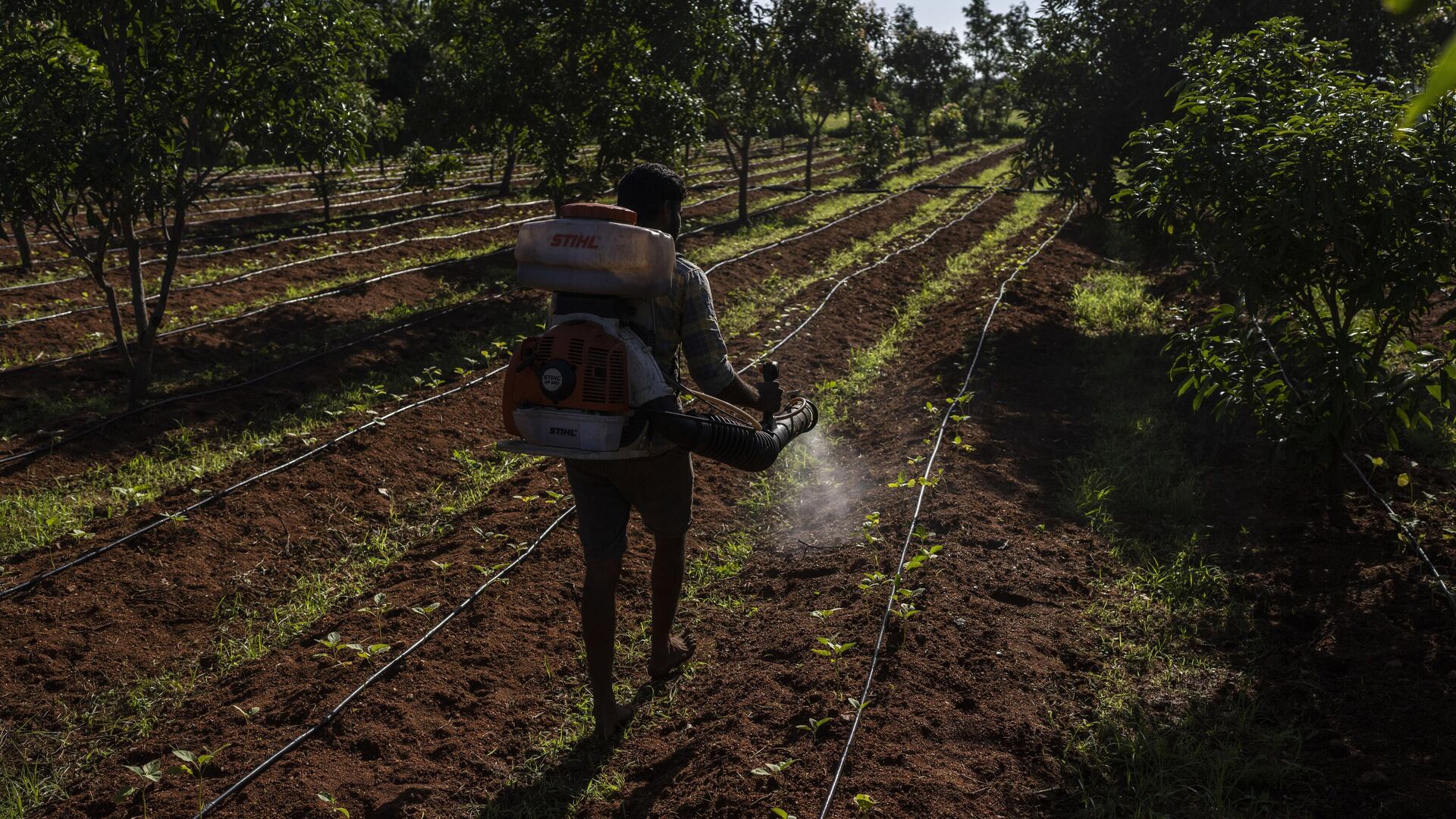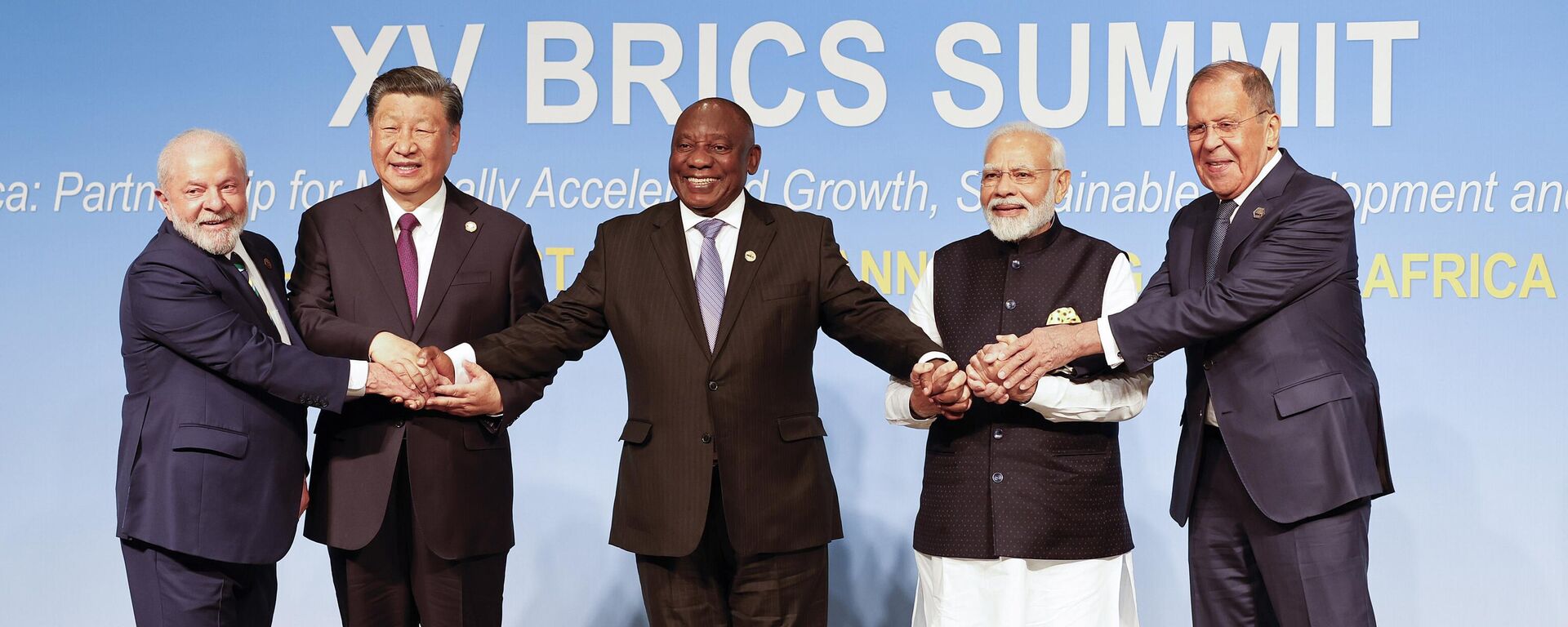https://sputniknews.in/20250702/us-farm-imports-would-further-impoverish-indian-farmers-ex-secretary-warns-9387644.html
US Farm Imports Would Further Impoverish Indian Farmers, Ex-Secretary Warns
US Farm Imports Would Further Impoverish Indian Farmers, Ex-Secretary Warns
Sputnik India
President Donald Trump said that the US and India would sign a trade deal. "Right now, India does not accept anybody in. I think India is going to do that, and if they do that, we are going to have a deal for much less tariffs".
2025-07-02T14:02+0530
2025-07-02T14:02+0530
2025-07-02T14:03+0530
terrorism
donald trump
nirmala sitharaman
new delhi
us
india
developing nations
global supply chains
global south
trade barriers
https://cdn1.img.sputniknews.in/img/07e7/03/11/1213071_0:160:3073:1888_1920x0_80_0_0_b4b80e4c5464bb6d773835159573b627.jpg
The Trump administration's demands that India should "open up" its market for US agricultural imports, including dairy and Genetically Modified (GM) products, would have adverse implications for Indian farmers, according to experts.An Indian team led by Rajesh Aggarwal, a Special Secretary in the Commerce Ministry, has been in Washington since 26 June to try and negotiate the first tranche of the India-US Bilateral Trade Agreement (BTA) before the 9 July deadline, after which the US could reinstate the 26% tariff on Indian imports which were announced on 2 April but later suspended for 90 days till 9 July. At present, the US has imposed 10% baseline tariffs on all Indian imports.Indian government sources have told the media that the trade talks have hit a stalemate over India's refusal to open up the agriculture and dairy sectors, which Finance Minister Nirmala Sitharaman has described as being New Delhi's "red lines".Hussain also echoed widespread apprehensions in India over the issue of Genetically Modified (GM) crops, which the US has been trying to push into India.The former top bureaucrat further raised red flags over the Trump administration's demand of gaining access to the Indian dairy market.Ashwani Mahajan, the Co-Convenor of economic advocacy group Swadeshi Jagran March (SJM), told Sputnik India that India has never ceded to the demand of foreign countries to open up certain critical sections of its agricultural sector, including for dairy products. Significantly, India excluded dairy products from its trade deal with Australia.He explained that at least 54.6% of India's population (2011 Census) was engaged in agriculture and allied activities, together contributing around 17.4% to the Gross Value Added (GVA) to the economy. However, around 85% of the farm landholdings were small and marginal, with less than 2 hectares in size."Opening up the agricultural sector to subsidized US farm imports would put Indian growers at a definite disadvantage and affect their livelihoods. If the US continues to pressure India on agricultural imports, we might as well have no trade deal at all with the US," said Mahajan.While India has expressed grave reservations about opening up its agricultural market for imports, the Trump administration has prioritised the issue of getting India to reduce tariffs on a range of product and commodity lines, including farm imports.A 2025 National Trade Estimate Report on Foreign Trade Barriers of the President of the United States on the Trade Agreements Program noted that India's World Trade Organization (WTO)-bound tariff rates on agricultural products averaged 113.1% and were as high as 300% in certain segments, making them among the highest in the world.The report by the US Trade Representative (USTR), released in March, reiterated the US demand calling on the Indian government to reduce tariffs on ethanol, dairy products, cattle feed and GM crops (including maize) among others."The US report noted that the federal regulator Foods Safety and Standards Authority of India (FSSAI) implemented an order in 2021, which requires a "non-GM" or "GM-free" tag for 24 listed products entering India. "India has not provided any scientific or risk-based justification for the requirement," the Trump administration report said.
https://sputniknews.in/20250314/brics-discusses-food-sovereignty-amid-us-tariff-threats-8862491.html
new delhi
us
india
global south
south asia
Sputnik India
feedback.hindi@sputniknews.com
+74956456601
MIA „Rossiya Segodnya“
2025
Dhairya Maheshwari
https://cdn1.img.sputniknews.in/img/07e6/0c/13/138962_0:0:641:640_100x100_80_0_0_2cb44360dbcdf6d84bf4b299cd045917.jpg
Dhairya Maheshwari
https://cdn1.img.sputniknews.in/img/07e6/0c/13/138962_0:0:641:640_100x100_80_0_0_2cb44360dbcdf6d84bf4b299cd045917.jpg
News
en_IN
Sputnik India
feedback.hindi@sputniknews.com
+74956456601
MIA „Rossiya Segodnya“
Sputnik India
feedback.hindi@sputniknews.com
+74956456601
MIA „Rossiya Segodnya“
Dhairya Maheshwari
https://cdn1.img.sputniknews.in/img/07e6/0c/13/138962_0:0:641:640_100x100_80_0_0_2cb44360dbcdf6d84bf4b299cd045917.jpg
trump news, trump tariffs, trump us dollar, india per capital income, india average income, india us trade deal, india us trade deal news, india us trade talks, india us trade, us agricultural exports, us tariffs, us dairy exports
trump news, trump tariffs, trump us dollar, india per capital income, india average income, india us trade deal, india us trade deal news, india us trade talks, india us trade, us agricultural exports, us tariffs, us dairy exports
US Farm Imports Would Further Impoverish Indian Farmers, Ex-Secretary Warns
14:02 02.07.2025 (Updated: 14:03 02.07.2025) President Donald Trump said on Monday that the US and India would sign a trade deal. "Right now, India does not accept anybody in. I think India is going to do that, and if they do that, we are going to have a deal for much less tariffs," he said.
The Trump administration's demands that India should "open up" its market for US agricultural imports, including dairy and Genetically Modified (GM) products, would have adverse implications for Indian farmers, according to experts.
An Indian team led by
Rajesh Aggarwal, a Special Secretary in the Commerce Ministry, has been in Washington since 26 June to try and negotiate the
first tranche of the
India-US Bilateral Trade Agreement (BTA) before the 9 July deadline, after which the US could reinstate the 26% tariff on Indian imports which were announced on 2 April but later suspended for 90 days till 9 July. At present, the US has imposed 10% baseline tariffs on all Indian imports.
Indian government sources have told the media that the trade talks have hit a stalemate over India's refusal to open up the agriculture and dairy sectors, which Finance Minister Nirmala Sitharaman has described as being New Delhi's "red lines".
"Most of India's agriculture, especially in eastern states, is subsistence farming. Cheap imports of agricultural commodities will depress the prices received by the Indian farmers and will further impoverish them," warned Siraj Hussain, previously posted as a Union Secretary in the Ministries of Food Processing Industries and Agriculture, in the Modi government.
Hussain also echoed widespread apprehensions in India over the issue of Genetically Modified (GM) crops, which the US has been trying to push into India.
"US soybean and corn are GM products. India has not approved any food crop which is GM," Hussain noted.
The former top bureaucrat further raised red flags over the Trump administration's demand of gaining access to the Indian dairy market.
"Indian dairy producers are very small-scale, owning just a few cows or buffaloes. The US dairy animals are also fed meals which could be non-vegetarian. About 30% of India's population is vegetarian, but this is the section which is most influential in policy-formulation," Hussain explained.
Ashwani Mahajan, the Co-Convenor of economic advocacy group Swadeshi Jagran March (SJM), told Sputnik India that India has never ceded to the demand of foreign countries to open up certain critical sections of its
agricultural sector, including for dairy products. Significantly, India excluded dairy products from its trade deal with Australia.
"India simply can’t cede to the US demand to open up sections of the agricultural sector. We won’t allow the entry of GM crops into India at any cost, be it maize or wheat. There are already several lawsuits in Indian courts as far as the feasibility of the GM crops in India is concerned," Mahajan said.
He explained that at least 54.6% of India's population (2011 Census) was engaged in agriculture and allied activities, together contributing around 17.4% to the Gross Value Added (GVA) to the economy. However, around 85% of the farm landholdings were small and marginal, with less than 2 hectares in size.
According to the US Department of Agriculture, the average farm size in the US is over 220 times bigger than India's, with government subsidies adding to give American farmers a definitive edge over their Indian peers.
In 2023, the median income from farming was $167,550 for households operating commercial farmers, according to USDA. In stark contrast, the average monthly income of an Indian agricultural household was just under $120 (10,218 INR), according to official figures released in December 2022.
"Opening up the agricultural sector to subsidized US farm imports would put Indian growers at a definite disadvantage and affect their livelihoods. If the US continues to pressure India on agricultural imports, we might as well have no trade deal at all with the US," said Mahajan.
While India has expressed
grave reservations about opening up its agricultural market for imports, the Trump administration has prioritised the issue of getting India to reduce tariffs on a range of product and commodity lines, including farm imports.
A 2025 National Trade Estimate Report on Foreign Trade Barriers of the President of the United States on the Trade Agreements Program noted that India's World Trade Organization (WTO)-bound tariff rates on agricultural products averaged 113.1% and were as high as 300% in certain segments, making them among the highest in the world.
The report by the US Trade Representative (USTR), released in March, reiterated the US demand calling on the Indian government to reduce tariffs on ethanol, dairy products, cattle feed and GM crops (including maize) among others.
"The US report noted that the federal regulator Foods Safety and Standards Authority of India (FSSAI) implemented an order in 2021, which requires a "non-GM" or "GM-free" tag for 24 listed products entering India. "India has not provided any scientific or risk-based justification for the requirement," the Trump administration report said.



